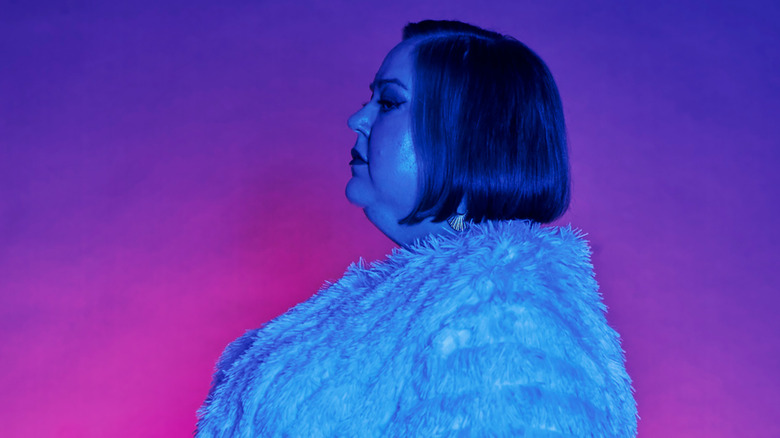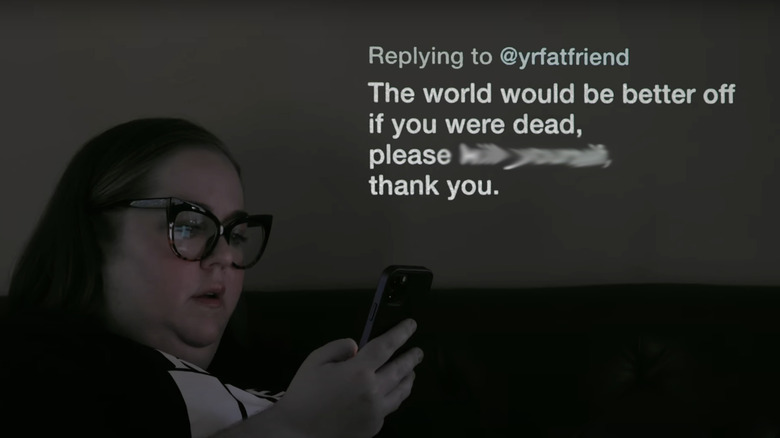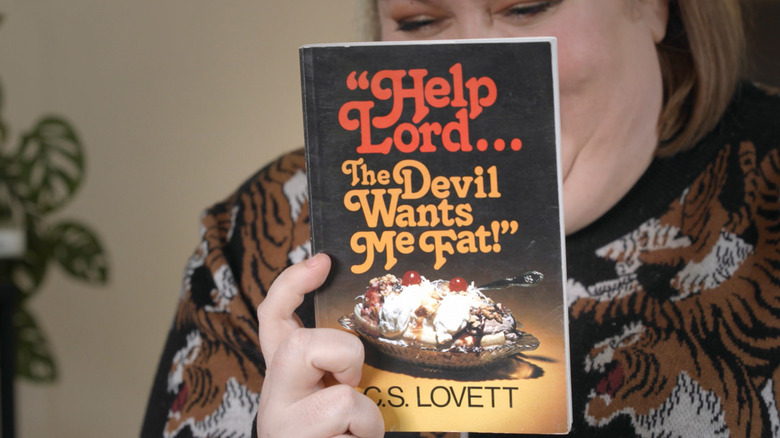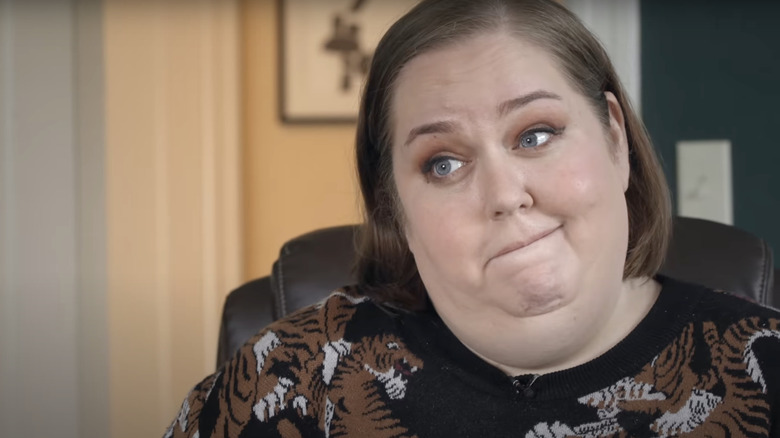A Bold New Documentary Does Everything The Whale Tried And Failed To Do
I once performed in a professional production of "Silence!," the musical parody of "Silence of the Lambs." I was cast in a dual role as Fredrica Bimmel and Catherine Martin — the "great big fat person" Jame "Buffalo Bill" Gumb coveted before murdering and dumping her in a body of water, and the woman he later kidnapped and kept in his basement hole before being rescued by Clarice Starling.
In the movie, Gumb asks Catherine if she's "about a size 14" before kidnapping her. In the musical, he has a hoedown song and dance number titled, "Are You About A Size 14?" featuring lyrics like "If you want to find the one / You need a girl who weighs a ton." I love the show and I loved playing the characters, but I couldn't help but laugh about the ridiculousness of it as I was and continue to be a size 22. In the world of "Silence of the Lambs," a size 14 provides enough flesh for Ted Levine to make a suit out of a woman to wear ... and I was four sizes larger.
The average American woman is a size 16, for the record.
I'm certainly not breaking any new ground by saying Hollywood sucks at showcasing, writing for, or understanding fat people. Fat actors are replaced by fit actors in fat suits, actors go to extreme lengths to maintain their "hot bods" (sometimes to the detriment of their own health), and I've lost count of how many times I've seen a fat character shown in a film as always eating. Perhaps worst of all, there are films like Darren Aronfsky's "The Whale" that are irredeemable presentations of cruelty disguised as "empathy."
This is why Jeanie Finlay's documentary on Aubrey Gordon, "Your Fat Friend," is a vital work of film.
Aubrey Gordon sets the stage
Aubrey Gordon is perhaps most well known for Maintenance Phase, the popular podcast she and her infectious laugh co-hosts with Michael Hobbes debunking the junk science behind health fads, wellness scams, and B.S. nutrition "advice." Before the Webby Award-winning podcast exploded in popularity, she was the writer of an anonymous blog called "YrFatFriend," a brilliant outlet for discussing the harsh realities of navigating our oppressive and hostile society in a fat body. "Your Fat Friend" is a look into Gordon's life and her transition from writing behind an innominate screen name to facing the public as a self-described "very fat person."
Even before her identity was made public, she was subject to the same abuse and harassment anyone fat who exists online has faced. Forums sprung up where people tried to figure out her identity with the sole intent of continuing to terrorize her. She was eventually doxed. There's a special brand of insidiousness that comes from fatphobic hatred online, but by showing the actual comments hurled at Gordon, anyone fortunate enough to have never been on the receiving end of the internet's ire can get the idea pretty quickly. "A lot of the work is exposing a bunch of traumas. Getting super vulnerable in super public ways is like giving people a roadmap of how to hurt me," Gordon says. Preach, sister.
But with all of the hate also comes a bevy of support. Fans of Gordon's writing line up around the building to meet her during the release of her book "What We Don't Talk About When We Talk About Fat," she's sent innumerable thank you messages for her transparency and vulnerability in talking about her life, and her frank (and often hilarious) teardowns of the myths and prejudices surrounding fatness and diet culture have done more for many than professional therapists.
Fat people defy the lie society has been sold
We live in a painfully fatphobic society, one where public accommodations view fat bodies as problems and believe a person's weight is also intrinsically linked with their character. It's why whenever I call myself "fat" my friends jump to say "No, you're beautiful" (excuse me, I am both) because in their minds, "fat" also means a load of other negative things like lazy, smelly, ugly, unmotivated, or revolting. People hate the existence of fat people, and they hate the existence of happy fat people even more.
We are told from birth that thinness is a moral high ground that brings happiness, success, and even love. I've lost track of how many times some gutless troll with a Namebunchofnumbers screen name has posted a photo of my wife and me with a caption like, "This whale has a wife and I can't even get a text back." (Probably 'cause you post weird stuff like that online, creep.) But these conversations aren't relegated to online. They're so rampant and embedded in the DNA of society that they've become the fabric of how all people, regardless of size, communicate.
Some of the documentary's strongest moments are when Gordon talks about her younger years and discusses fatness with her parents. A scene that cut through me like a knife was hearing Gordon tell her mother that hearing her mom talk down about her own body directly affected how Gordon saw her own. It's something any fat person can relate to. When your noticeably thinner friend or family member says "Ugh, I'm so fat, I hate myself," what sort of message are we supposed to take away about how our loved ones view us? The doc is loaded with little moments like this that highlight the way small comments like feeling guilt after Thanksgiving dinner have a compounding, ripple effect on everyone around us.
Aubrey is also an avid collector of vintage diet books, and watching her read the ridiculous titles is hilarious, but deeply upsetting when you remember how many people treat these books like a bible.
'You can't love your way out of oppression'
"Your Fat Friend" isn't attempting to solve fatphobia or provide a history lesson on fatness in America (which would require six seasons of hour-long episodes at minimum), and instead uses the character-driven focus of Aubrey Gordon's existence and activism as a reminder to the world at large that society is permissibly cruel to fat people. Whenever fat people talk candidly about the obstacles we face or justifiably complain about the garbage treatment we receive, we're always told to "love ourselves."
Sounds good, except loving myself isn't going to make a doctor prescribe me an antibiotic instead of weight loss when I come in complaining about a sinus infection. Captioning my photos with "sexy isn't a size it's a state of mind" isn't going to magically remind an employer that my work ethic is not dictated by my weight in a country where weight discrimination is perfectly legal in the workplace in most states. Or as Aubrey Gordon puts it, "you can't love your way out of oppression."
The big lie about anti-fat bias is that people believe it has to deal with internal factors when the reality is that fat people who are miserable feel that way because society is so inhospitable, discriminatory, and inaccessible. It's why I seriously thought I was going to lose my f***ing mind hearing people call "The Whale" a "brave" or "moving" film when it fails to acknowledge the actual problems fat people face and instead presents "the nightmare of a thin person come to life, disguising a cautionary tale as one of humanity while dehumanizing the protagonist at every turn." This documentary is about Aubrey Gordon's rise in fame, yes, but it's also a reflection of the day-to-day experience of millions. It's honest and empathetic without ever begging the audience to see fat people as human.
Either you see us that way, or you don't, and that's your issue to work through on your own time and dime.
"Your Fat Friend" is available in limited theaters and on VOD through Jolt.



